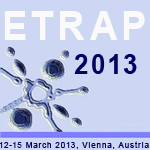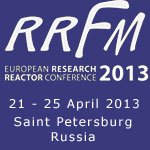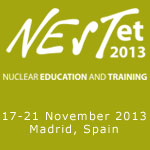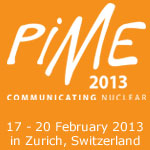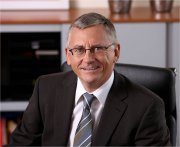
An interview of Dr. Ralf Güldner, CEO of E.ON Kernkraft GmbH, carried out by our Young Generation friends in France and Germany.

|
Société Française d’Energie Nucléaire
Kerntechnische Gesellschaft e.V |
 |
SFEN – Jeune Génération – Denis Janin
KTG – Junge Generation – Tobias Zschöckner
Interview of Dr. Ralf Güldner– CEO of E.ON Kernkraft GmbH
Could you briefly present your career to date and highlight its key milestones?
I graduated in Chemistry at the University of Munich. In 1981, my professional career started in radioprotection at Siemens’ nuclear activities department, where I worked as a process engineer. After having held different managerial position within the company, in 1999 I became Siemen’s Head of Nuclear Fuel Business in Europe.
In 2001, I joined Framatome ANP in Germany, before moving to Paris, where I was appointed Executive Vice President of the Fuel Business Unit, in 2006. In 2008, I returned to Germany and joined E.ON as Managing Director.
|
When I stand back and look at my career I see that it has been marked by three major events so far: the Chernobyl accident, which defined new rules for our business; my move to France, where working on the creation of AREVA was a highly valuable experience and returning to Germany to work for a utility, during which time facing the consequences of the Fukushima accident was, of course a major challenge – a challenge that is still on-going.
|
Germany decided in March 2011 to phase-out nuclear energy and launch an “energy transition” - the “Energiewende”. How will this affect the country?
First, let me recall the context within which this decision was made. Over the course of a weekend Germany decided to phase-out nuclear energy more rapidly than it had initially decided a couple of months earlier and to shut down 8 units immediately - a decision that put considerable stress on the entire European energy supply system. In my opinion, this was the fastest and most drastic political decision affecting our business that has ever been taken. Personally, as a German and a European citizen, I wonder how a leading European country could take such a far-reaching decision without first consulting with its neighbours.
Before this, the decision that had been taken in 2010 was at least coherent. It had been agreed that an energy transition should be prepared while benefiting from our past investments, and that the phasing-out of nuclear energy should occur progressively, using the profits made from nuclear to support the transition economically. However, as democratic nation we have to accept this decision, which was supported by a majority of German citizens.
But we also have to be aware of the challenges that come with this “Energiewende”. Energy prices will continue to rise and we have to inform people of the full truth about the future consequences of this transition. This is an obligation that our politicians must fulfill.
In contrast, we now have a system where renewable energies are highly subsidised. This is not sustainable as it will lead to electricity prices that are uncompetitive compared with other economies. Furthermore, our grid capacities are insufficient and we need new transmission lines to assure grid stability and security of supply.
Last but not least, I think German citizens need to change their attitude. People here are too often against any new project, not only concerning energy but also other large scale investments, such as the “Stuttgart 21” train station project. This attitude will prove to be a real obstacle to achieving a successful energy transition and, therefore, to ensuring the competitiveness of our economy in the future
What are the consequences for E.ON Kernkraft?
As a company operating nuclear power plants (NPPs) in Germany, E.ON Kernkraft had to shut-down immediately 2 NPP units: Unterweser and Isar 1. Our other plants will be progressively shut down by 2022. In addition, we had to write off several assets while still paying the special tax on nuclear fuel that was decided upon in 2010. And we are also facing new challenges, such as early decommissioning.
We need to ensure that we have enough well-trained staff to operate and maintain our plants, which will remain online for the next 10 years. Our staffing plan shows a rather good match between our needs and our current work force. Nevertheless, we need to recruit new people and provide them with the education required for specific positions in our NPPs. We will first try to recruit them internally from other E.ON units, as we know that hiring external people within this phase-out context will not be easy.
In addition, we have to keep an eye on developments with our current contractors. As with any utility, we need support from our suppliers - especially from the Original Equipment Manufacturers (OEMs) – in order to maintain the safe operation of our NPPs. It is in our best interest to maintain the skills and capabilities of our key suppliers over the next years and even decades.
Are E.ON NPPs prepared to operate beyond their indicated lifetime if this were to be required by the government?
It is difficult to know with certainty where the energy transition will be in 10 years from now. Our current investments are meant to ensure the highest level of safety and reliability for our NPPs. If by 2020 we are asked by the government to extend the lifetime of units that are still in operation, our plants will still be technically able to fulfill this task. However, we are not planning for such an eventuality.
You mentioned decommissioning. Does E.ON already have a decommission strategy for its NPPs?
We have already accumulated experience in decommissioning. In Stade and Würgassen our teams have developed specific skills and a broad knowledge of decommissioning. We intend to use this successful experience to good effect with our forthcoming projects. Our Centre of Competence for Nuclear Decommissioning coordinates these activities from Hanover.
For the units shut down in March 2011, we need first to unload the fuel. This should be done by 2015 for Unterweser and by 2016/17 for Isar 1. Then we need to know under which conditions the waste will be sent to the final disposal and we need certainty about the commissioning of the final disposal site. So far, these decisions have not yet been taken by our government. As this clearly impacts upon our decommissioning strategy we need clear messages and action from the German government.
Decommissioning will become a core activity for our company. We will focus on our projects first, but we might develop this business externally too if we have enough resources to do so - perhaps through the creation of partnerships as we don’t have all the required capabilities in-house and will not take full responsibility over assets from other owners.
The European Commission recently released a report on the so-called “Stress-tests” conducted at all NPPs in Europe. Will the conclusions reached have a large impact upon E.ON plants?
I think that the conclusions of the European Commission have somehow been misunderstood by the press. In the original document from ENSREG it was concluded that German plants – including units planned for shutdown – have a good safety level. No significant improvements for E.ON plants were required following the European stress-tests. Nevertheless, some improvements were implemented even before the EU stress test results were published. Others, like improving the seismic instrumentation in Grohnde, are on-going. We always work according to a process of continuous improvement in order to maintain the highest safety levels.
Globally-speaking nuclear energy seems to be under pressure. What future do you expect for nuclear power?
Nuclear is part of the solution for decarbonising the global energy mix. I am convinced that nuclear energy will grow over the next few years. Renewables will not alone provide the solution, we need base-load power to support our industry and nuclear provides carbon-free base-load power.
As far as new build projects are concerned, we need them to be a success. As projects in France and in Finland are not proceeding as expected we have to restore confidence in our industry. Projects in the US and in China have to be successful to convince investors. Vendors have to confirm their capability to deliver on time and on budget.
Around the world, the picture varies from region to region. A strong increase in nuclear energy is clearly taking place in Asia. This will continue. In the US, shale gas changed the rules and delayed some nuclear new build projects. But if concerns on climate change are reaffirmed, I am confident that new nuclear projects will continue to be launched.
Moreover, some countries are still showing fresh interest in nuclear energy. For example, Arab countries like Saudi Arabia, which today rely mostly on oil. The challenge there is huge as an entire nuclear programme has to be built, including infrastructure, licensing authorities, etc. This might provide a great opportunity for the nuclear industry over the next years.
In Europe too, the situation is diverse. Some countries, e.g. the UK, Poland and the Czech Republic, are intending to extend their nuclear capacities or even to start up new nuclear programmes. Other countries, like Germany, France and Belgium, are willing to decrease or phase-out nuclear energy while installing greater renewables capacity. Regarding nuclear in France, I think EDF will have to both extend the lifetime of its nuclear fleet and launch a new build programme.
Globally, the main challenge for new nuclear development remains competitiveness. In Europe, electricity demand has been reduced due to the economic crisis and prices are still very low. So, any new power plant project is very hard to set up at the moment. We also have to be cautious about what we compare nuclear to in the future: I believe nuclear power is competitive compared to unsubsidised off-shore wind, solar power etc., but if we are ready to reduce our ambitious climate protection targets and develop shale gas it might be difficult for nuclear to compete with this.
Regarding E.ON, we decided to withdraw from two nuclear new build projects in 2012. Hitachi invested around £700m to buy Horizon Nuclear Power, our former joint venture with RWE. I am looking forward to seeing how things develop in the future as the UK desperately needs new nuclear power. On the other hand, we decided to sell our stake in Fennovoima. These decisions are driven by E.ON internal factors such as our need to reduce debt and by external factors like the outlook for European power markets.
We see in the US a great interest in small modular reactors (SMRs). Do you believe that these reactors will play a role in the future of nuclear energy?
Yes! Even if these reactors still have to prove their economic viability, they do seem to present several advantages for the energy sector. Firstly, small means less capital intensive, less risky projects and a faster revenue stream. For private energy companies like E.ON such a cash-flow curve is of particular interest.
Then, standardised and simpler designs based on modules should allow for fast and predictable construction. In addition, these designs might address new or niche markets and could have a broad range of applications - from electricity generation to desalination or heat production. Vendors should continue to work on these products to make them part of the energy solution.
Do you have a message for the Young Generation, students & young professionals who intend to work in the nuclear industry?
Nuclear energy has a future. I am confident that we can operate nuclear power plants in a safe and reliable manner and I see strong potential for further developments of this technology. It is a rather young business and a lot remains to be done: we need young, talented and motivated people to follow in the footsteps of the pioneers who developed it in the last century.
As regards Germany, we have to be pragmatic: I admit that for young engineers it seems not to be the most attractive job opportunity if you are thinking about a career of 40 years. But it still offers challenging tasks and chances to develop personal skills - and why not start in nuclear in Germany first to then go abroad or work for international companies that are based in Germany.
Also, I would like to emphasise the need for young professionals to work continuously on their personal development. Each of us is the sole owner and manager of his or her career. Therefore, it’s important to think about one’s priorities when considering what to do today and tomorrow. Based on such a “roadmap” approach everybody should make his or her decision about what next step to take without being influenced by others. We must seek the continuous development of our skills.
|

